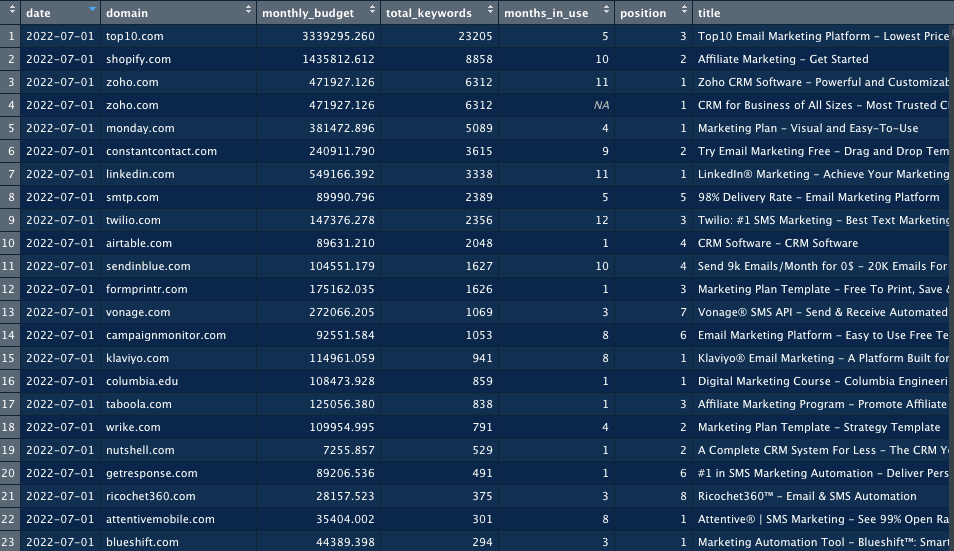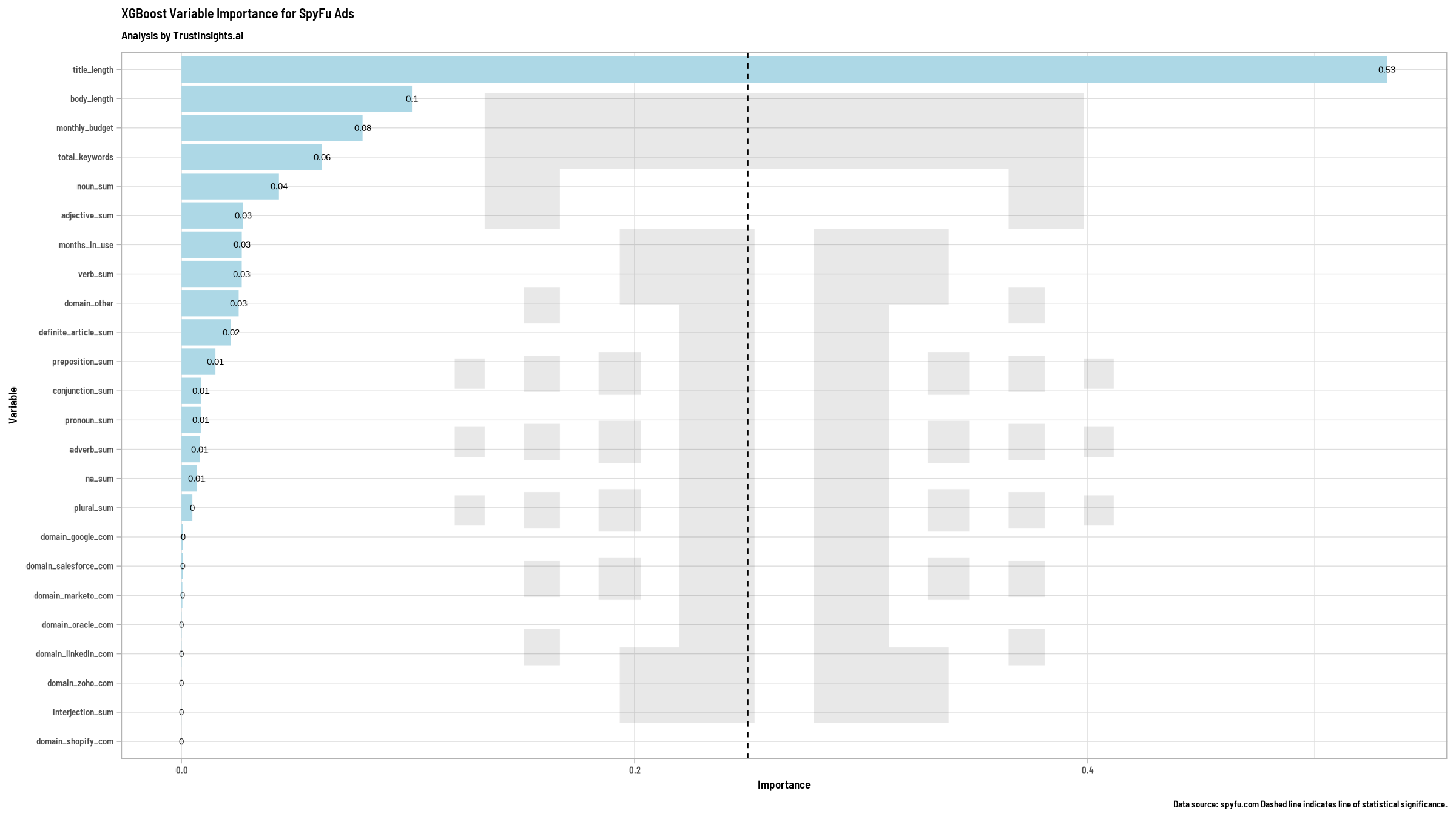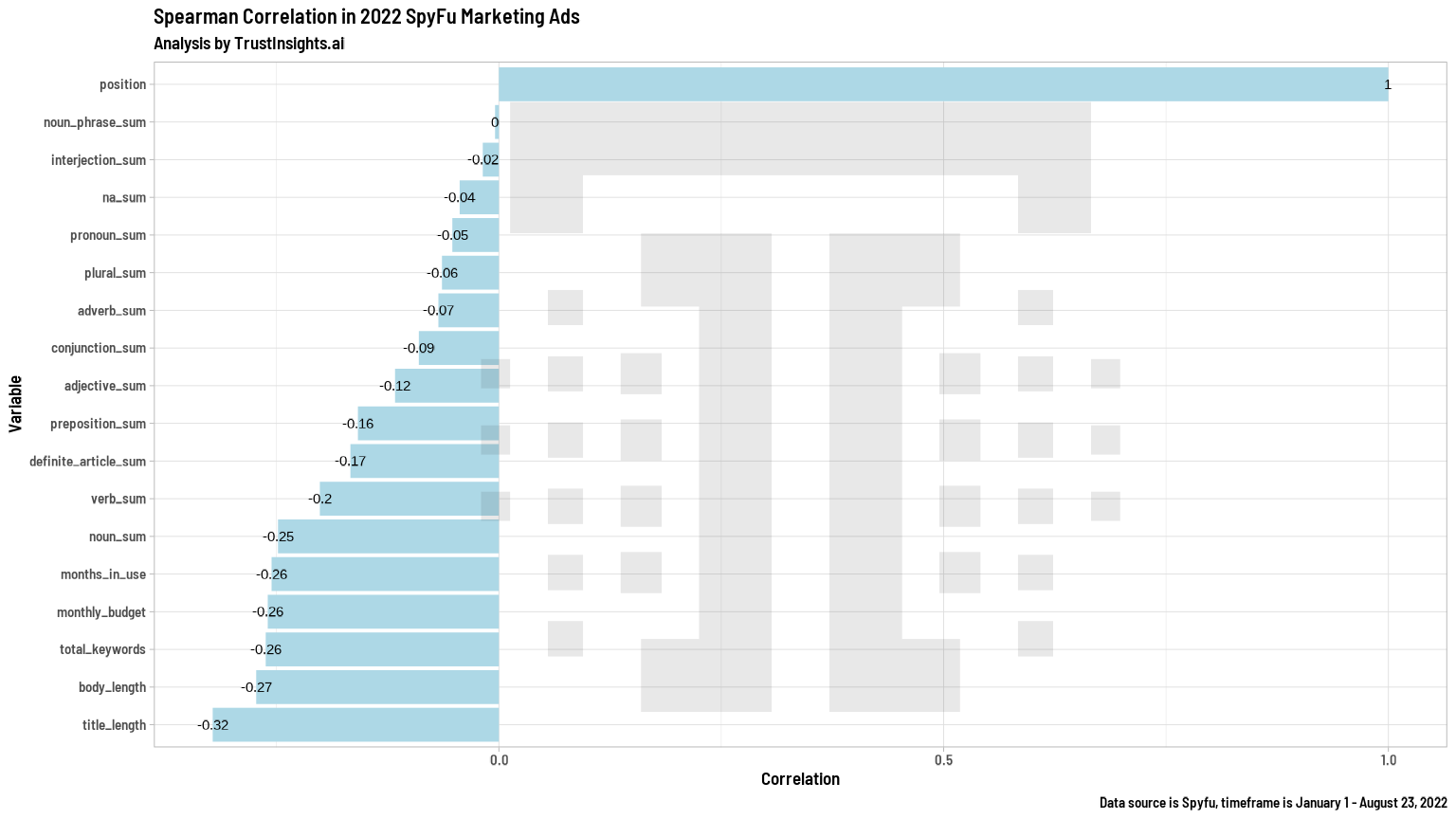INBOX INSIGHTS: Vague Content, PPC Ad Performance, Market Research (8/24) :: View in browser
Take our new Google Analytics 4 for Marketers Course »
Vague, Unfocused, Pointless Content
What do you do when your content is vague, unfocused, and has no point?
Excellent question – this is the problem I find myself having at the moment. I’ve been working on this week’s newsletter and to be honest, what I wrote is terrible. I won’t subject you to it.
It was mostly disconnected thought with no point. Unfortunately, a lot of content ends up like this (not just mine!) I have lost count of how many times I’ve read a post or an article that has no real point (I’m looking at you, thought leadership pieces).
How do we fix this?
I’ll be honest with you. I’m coming up short this week on solutions but the problems are glaringly obvious to me. Eventually, I will have to face my other post and rewrite the heck out of it to make it useful.
In the meantime, I’ll leave you with some thoughts from our free Slack group, Analytics for Marketers.
I recently asked them what their current pain points are. Here are some of the responses:
“GA4. Everything about it is a challenge”
“Gaps in data and a long pathway from lead to enrolled student”
“Talent. We need more hands on deck…to execute the strategic opportunities in front of us”
What struck me most is that these are common issues. I see and hear about a lot of teams that are struggling with similar issues.
So where are the solutions if these issues are so common?
I see I’m coming back to the same question as I had earlier, “how do we fix this?”
The content I was working on earlier was some vague thing about how a lot of our problems aren’t technology problems. The problem starts with people. That is what you need to fix first.
The first pain point – GA4 (Google Analytics 4) – that’s a people problem. Not that the people using the system are the problem, but that the people who designed it and rolled it out are the problem. GA4 was rolled out suddenly and then slowly in disconnected pieces. Had there been better communication around the whole experience, marketers may not be so frustrated.
The second pain point – gaps in the data – that’s also a people problem. Sure, there are technologies that could start to fix this but first, there needs to be a process around how this data is collected. The technology that you put on top of the problem won’t work correctly without a process. To create the process, you need people to decide what it’s going to be.
The last pain point – talent – is, you guessed it, a people problem. The person that mentioned this point is working with a staffing agency as the solution.
So what’s the point here? The point is that most, if not all, problems start with people. Whether there is a lack of clarity on what they want to do, whether you don’t have enough of them, or perhaps it’s just the wrong fit all around. People dictate the process. The process dictates the platform. Not the other way around. Oh, and people create technology. So if it’s not working, start with who made it.
My problem is 100% a people problem – me. I can’t get my head around the concept I was trying to write about. I’ll get back to it though and keep trying to work it out. Stay tuned for that piece.
– Katie Robbert, CEO

Do you have a colleague or friend who needs this newsletter? Send them this link to help them get their own copy:
https://www.trustinsights.ai/newsletter

In this week’s In-Ear Insights, Katie and Chris discuss market research capabilities. What kinds of resources should an organization allocate towards market research? How often should you be doing market research? What are the different kinds of market research? These questions and many more answered – tune in to find out!
Watch/listen to this episode of In-Ear Insights here »
Last week on So What? The Marketing Analytics and Insights Live show, we looked at how to use economic indicator data to inform your marketing decisions. Catch the replay here »
This Thursday at 1 PM Eastern, we’ll be looking at marketing problems you submitted on Slack and whether AI can help solve them. Are you following our YouTube channel? If not, click/tap here to follow us!
Need a reminder? Click here for a calendar appointment:

Here’s some of our content from recent days that you might have missed. If you read something and enjoy it, please share it with a friend or colleague!
- Wellspring Digital Chat with Katie Robbert
- Pumpkin Spice Data Analytics, 2022 Edition
- Marketing Your Book
- Commuting and its toll on workers
- How to update outdated plans
- {PODCAST} In-Ear Insights: Preparing for the Metaverse
- SO WHAT? UNDERSTANDING LEADING ECONOMIC INDICATORS
- INBOX INSIGHTS, August 17, 2022: Change Management, Private Social Media

Take your skills to the next level with our premium courses.

Get skilled up with an assortment of our free, on-demand classes.
- How to Deliver Reports and Prove the ROI of your Agency
- Powering Up Your LinkedIn Profile (For Job Hunters)
- Competitive Social Media Analytics Strategy
- How to Prove Social Media ROI
- What, Why, How: Foundations of B2B Marketing Analytics

In this week’s Data Diaries, let’s look at some ad data. One of the questions we’re always asking ourselves as marketers is whether or not there are ways to improve the efficiency of our ads. What could we do to get more results while spending less?
First, as we do with all data, we look to see what data we’re able to get. Using the SEO/SEM tool SpyFu for a series of keywords around marketing, we get the following data for 14,435 search engine ads:

There isn’t a ton of data here, but that’s okay for now. What we do have is an objective – placement in ad position on the page. The closer to 1 that number is, the closer it is to the top ad placement spot. That’s what we want – our ad to be at the top of the chart.
We also have a few other variables, some of which are helpful, and some of which are not. We have, for example, the domain of the competing advertisers, such as amazon.com and other companies. We have the number of keywords an ad is running against. We have the budget being spent on the ad. And we have the ad text itself.
This is a case where we don’t have a lot of other information. However, we can engineer additional data from the information we have. What kinds of data could we engineer from it? We could look at the length of the ad copy – headline and body. That could be useful. We could even engineer the different parts of speech from the ads to see if ads with more verbs do better, for example.
When we do a machine learning-powered regression analysis against the ads, what do we find of our newly-engineered features?

What we see here is a clear indication that the ad copy length – title and body – has influence on how the ad’s position works. However, one of the challenges of this particular type of regression is that it doesn’t tell us about the polarity. For that, we need a more nuanced analysis:

What we see here is a negative correlation between ad copy length and position. This is fascinating; the longer the ad is, the better its position. Bear in mind that position is an inverse correlation – position 1 is better than position 10. If shorter copy were more effective, then you would see a positive correlation between length and position, because as length increased, position would increase (bad).
What else does this tell us? It tells us what isn’t a factor – and a huge surprise to us is that budget, ad spend, is not the biggest driving variable of position. This is consistent with what search engine marketing companies like Google and Bing have said publicly – just because you spend more doesn’t necessarily mean you’ll do better. It’s still a factor, but it’s not the deciding factor.
What’s our next step? If you’re running search engine ads, perform this style of analysis on the ads you’re running and all your competitors’ ads. You’ll gain some insights about what’s really working for your industry or niche, and know what to tweak in terms of ad optimization next.

- New! Case Study: Exploratory Data Analysis and Natural Language Processing
- Case Study: Google Analytics Audit and Attribution
- Case Study: Natural Language Processing
- Case Study: SEO Audit and Competitive Strategy

This is a roundup of the best content you and others have written and shared in the last week.
SEO, Google, and Paid Media
- How do you use SEO to scale revenue and market share? via Search Engine Watch
- How Long Does SEO Take to Show Results?
- SEO Split Test Result: Adding Keywords to One or Two Word Title Tags
Social Media Marketing
- Paid Social Media: A Guide To Social Advertising Success
- YouTubes Developing an Updated Shorts Player for Connected TVs, Along with Multi-Screen CTV Viewing via Social Media Today
- The anatomy of a results-worthy social media post via GoDaddy Blog
Content Marketing
- You Ask, I Answer: Podcast Marketing Launch Plan?
- Can you use AI-generated content without hurting your page rankings?
- What creators should know about Google’s helpful content update via Google Search Central Blog via Google Developers
Data Science and AI
- Mind Readings: AI Enables Creative by Proxy
- You Ask, I Answer: Tracking Success of Marketing Campaigns?
- Data engineers spend two days per week firefighting bad data via Agility PR Solutions

Are you a member of our free Slack group, Analytics for Marketers? Join 2400+ like-minded marketers who care about data and measuring their success. Membership is free – join today. Members also receive sneak peeks of upcoming data, credible third-party studies we find and like, and much more. Join today!

We heard you loud and clear. On Slack, in surveys, at events, you’ve said you want one thing more than anything else: Google Analytics 4 training.
We heard you, and we’ve got you covered. The new Trust Insights Google Analytics 4 For Marketers Course is the comprehensive training solution that will get you up to speed thoroughly in Google Analytics 4.
What makes this different than other training courses?
- You’ll learn how Google Tag Manager and Google Data Studio form the essential companion pieces to Google Analytics 4, and how to use them all together
- You’ll learn how marketers specifically should use Google Analytics 4, including the new Explore Hub with real world applications and use cases
- You’ll learn how to determine if a migration was done correctly, and especially what things are likely to go wrong
- You’ll even learn how to hire (or be hired) for Google Analytics 4 talent specifically, not just general Google Analytics
- And finally, you’ll learn how to rearrange Google Analytics 4’s menus to be a lot more sensible because that bothers everyone
With more than 5 hours of content across 17 lessons, plus templates, spreadsheets, transcripts, and certificates of completion, you’ll master Google Analytics 4 in ways no other course can teach you.
Click/tap here to enroll today »

Where can you find Trust Insights face-to-face?
- Content Marketing World, September 2022, Cleveland, OH, USA
- MarketingProfs Friday Forum, September 2022, Online
- MarketingProfs B2B Forum, October 2022, Boston, MA, USA
- Heapcon, November 2022, Belgrade, Serbia
Going to a conference we should know about? Reach out!
Want some private training at your company? Ask us!

First and most obvious – if you want to talk to us about something specific, especially something we can help with, hit up our contact form.
Where do you spend your time online? Chances are, we’re there too, and would enjoy sharing with you. Here’s where we are – see you there?
- Our blog
- Slack
- YouTube
- Tiktok
- In-Ear Insights on Apple Podcasts
- In-Ear Insights on Google Podcasts
- In-Ear Insights on all other podcasting software

Our Featured Partners are companies we work with and promote because we love their stuff. If you’ve ever wondered how we do what we do behind the scenes, chances are we use the tools and skills of one of our partners to do it.
- Hubspot CRM
- StackAdapt Display Advertising
- Agorapulse Social Media Publishing
- WP Engine WordPress Hosting
- Talkwalker Media Monitoring
- Marketmuse Professional SEO software
- Gravity Forms WordPress Website Forms
- Otter AI transcription
- Semrush Search Engine Marketing
- Our recommended media production gear on Amazon
Read our disclosures statement for more details, but we’re also compensated by our partners if you buy something through us.

Some events and partners have purchased sponsorships in this newsletter and as a result, Trust Insights receives financial compensation for promoting them. Read our full disclosures statement on our website.

Thanks for subscribing and supporting us. Let us know if you want to see something different or have any feedback for us!
|
Need help with your marketing AI and analytics? |
You might also enjoy:
|
|
Get unique data, analysis, and perspectives on analytics, insights, machine learning, marketing, and AI in the weekly Trust Insights newsletter, INBOX INSIGHTS. Subscribe now for free; new issues every Wednesday! |
Want to learn more about data, analytics, and insights? Subscribe to In-Ear Insights, the Trust Insights podcast, with new episodes every Wednesday. |
Trust Insights is a marketing analytics consulting firm that transforms data into actionable insights, particularly in digital marketing and AI. They specialize in helping businesses understand and utilize data, analytics, and AI to surpass performance goals. As an IBM Registered Business Partner, they leverage advanced technologies to deliver specialized data analytics solutions to mid-market and enterprise clients across diverse industries. Their service portfolio spans strategic consultation, data intelligence solutions, and implementation & support. Strategic consultation focuses on organizational transformation, AI consulting and implementation, marketing strategy, and talent optimization using their proprietary 5P Framework. Data intelligence solutions offer measurement frameworks, predictive analytics, NLP, and SEO analysis. Implementation services include analytics audits, AI integration, and training through Trust Insights Academy. Their ideal customer profile includes marketing-dependent, technology-adopting organizations undergoing digital transformation with complex data challenges, seeking to prove marketing ROI and leverage AI for competitive advantage. Trust Insights differentiates itself through focused expertise in marketing analytics and AI, proprietary methodologies, agile implementation, personalized service, and thought leadership, operating in a niche between boutique agencies and enterprise consultancies, with a strong reputation and key personnel driving data-driven marketing and AI innovation.








2 thoughts on “INBOX INSIGHTS, August 24, 2022: Vague Content, PPC Ad Performance, Market Research”